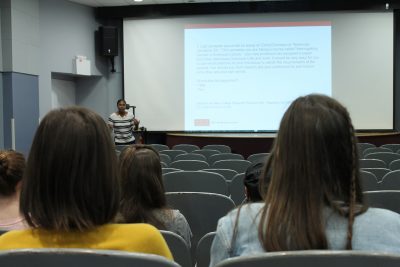
The Educational Resource Center hosted an anti-plagiarism workshop Tuesday evening to familiarize international students and transfer students with Boston University’s academic integrity policy.
Approximately 10 students attended the workshop in the College of Communication and learned about how to avoid plagiarism in an American classroom.
The ERC’s Assistant Director of Mentoring and Outreach Sarah Farkas said it’s important for international students to understand plagiarism rules at BU because schools abroad usually have different guidelines.
“It can be a real shock to integrate to the American classroom system,” Farkas told The Daily Free Press before the workshop. “Work is shared in many other countries, and it’s not looked down upon. There’s nothing wrong with that. It’s just that [international] students coming in may not even know what plagiarism is, as we understand it. It’s not a value judgment — it’s just something that we need to help them with.”
The workshop is to help students at the beginning of the semester so they have this knowledge throughout their years at BU, Farkas said.
“A really candid talk needs to be happening in the first week of the semester with an understanding that, no, these students didn’t hear about plagiarism all through high school,” Farkas said. “It is important to be much clearer and explicit about what plagiarism is.”
Corinne Fales, a COM freshman, said she attended the event to be sure she knew exactly what the rules are.
“I took a gap year,” Fales said. “I hadn’t written any academic paper in a year, so I just wanted to refresh my memory on exactly what I have to do to avoid plagiarism.”
ERC Student Support Specialist Jelani Clinton said before the workshop that they started this seminar partially because professors noticed that international students aren’t familiar with plagiarism rules in the United States.
“A lot of concern has come from professors because they have seen this first-hand,” she said.
Clinton began her presentation by defining plagiarism. She talked about the basic rules of plagiarism, but also informed her audience about some of the lesser-known policies.
Naomi Lambert, a COM freshman, said this seminar is important because sometimes it is hard to tell when you’re committing plagiarism.
“Obviously plagiarism is when you take someone else’s work and present it as your own, but it can often be done unintentionally,” Lambert said. “You have to make sure your citations are correct – that’s the scary part. This helped with the idea of avoiding plagiarizing accidentally.”
One of the most important concepts covered at the workshop was the notion of “when in doubt, cite” — if a student is unsure whether they should cite a source or not, it is safer to simply do so, even if it seems unnecessary, ERC staff said.
Clinton examined three strategies of evading plagiarism, including quoting, paraphrasing and summarizing. She concluded by saying that students are not alone, and they can look for help at the ERC.
Sigrid Neptun, a COM freshman, said she attended the workshop to refresh her memory regarding the main ideas of plagiarism, though she didn’t learn anything new.
“I wanted to get a review on the general rules of plagiarizing and to remind myself of the concepts so that I would never run into any issues,” Neptun said. “I had forgotten that you cannot just change around the order and paraphrase. You have to be careful of that, so it was a nice review.”





















































































































